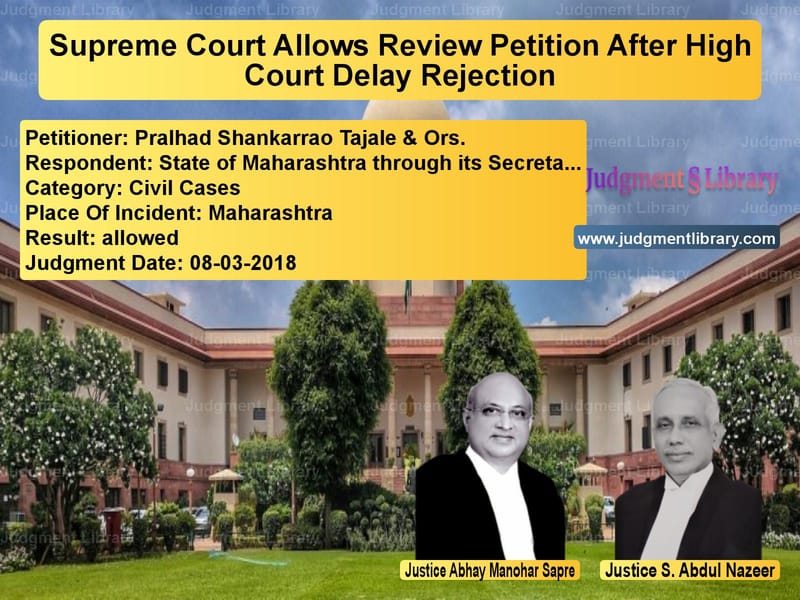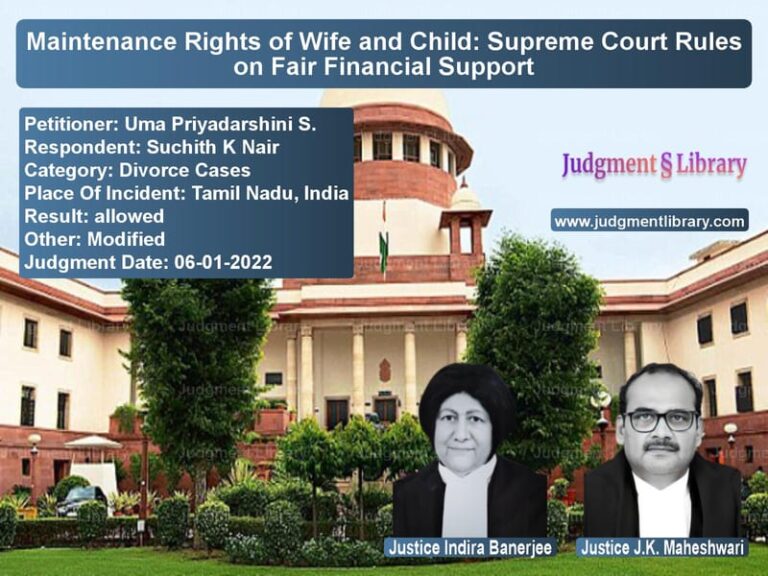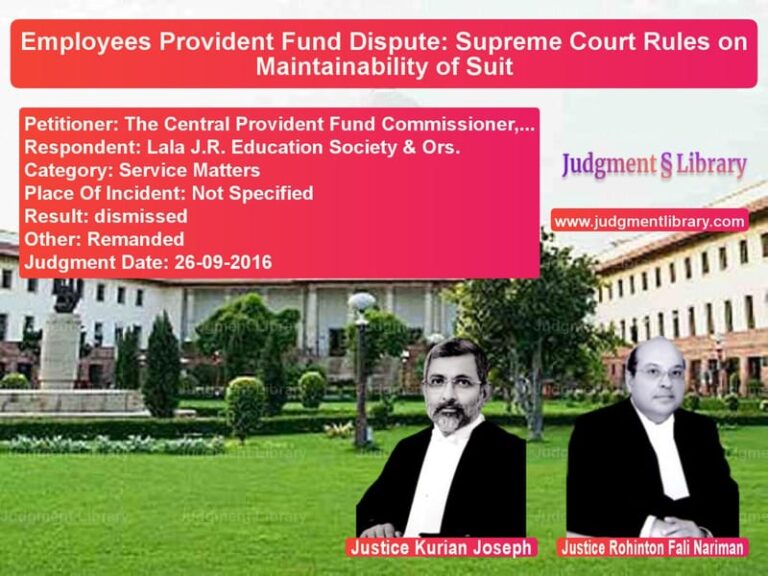Supreme Court Allows Review Petition After High Court Delay Rejection
The case of Pralhad Shankarrao Tajale & Ors. v. State of Maharashtra revolved around a long-standing land dispute and the procedural complications that led to a rejected review application. The Supreme Court was tasked with determining whether the delay in filing and curing procedural defects should have led to outright dismissal or if justice demanded a more lenient approach.
Background of the Case
The appellants, Pralhad Shankarrao Tajale and others, initially filed a writ petition in 2012 before the High Court of Bombay challenging an order dated 14.05.2012 by the State Minister for Revenue of Maharashtra. The dispute concerned a land-related matter where the appellants’ revision application had been dismissed. However, the Single Judge of the High Court dismissed their writ petition on 27.11.2012.
Unhappy with this outcome, the appellants filed an intra-court appeal before the Division Bench (L.P.A. No. 33 of 2013). On 22.03.2014, the Division Bench allowed them to withdraw the appeal and granted them liberty to file a review petition before the Single Judge.
Filing of the Review Petition and Procedural Issues
Following the liberty granted by the Division Bench, the appellants filed a review application (Review Application No. 3330/2015) on 17.04.2014, accompanied by an application for condonation of delay.
The High Court Registry, however, pointed out defects in the filing, directing the appellants to rectify them before listing the case for hearing. Since the appellants did not rectify these defects, the matter was brought before the Registrar (Judicial-1) on 19.10.2015. The Registrar granted four weeks for rectification but warned that failure to comply would result in rejection of the review application.
Despite this warning, the appellants did not act within the given timeframe. Consequently, their review application was dismissed due to non-compliance with procedural requirements. The appellants, in response, filed Civil Application No. 120 of 2016, seeking restoration of their review application. However, the Single Judge of the High Court dismissed their request, citing an unjustified delay.
Arguments by the Appellants
The appellants contended that:
- The delay in rectifying procedural defects was unintentional and should not have led to rejection of the review application.
- The High Court should have considered the substantial nature of their case rather than dismissing it on procedural grounds.
- They should have been given one more opportunity to comply with the Registry’s requirements.
Arguments by the Respondents
The State of Maharashtra, represented by counsel, argued that:
- The appellants failed to comply with multiple opportunities granted by the High Court, demonstrating negligence.
- Procedural rules exist to ensure judicial efficiency, and repeated delays undermine this purpose.
- The High Court was justified in rejecting the review application after the appellants failed to meet the deadlines.
Supreme Court’s Judgment
The Supreme Court, after hearing both parties, held:
“In our opinion, keeping in view the aforementioned observations and further having regard to the nature of controversy involved in the case, the High Court should have been liberal in taking a view in the matter and accordingly should have condoned the delay and granted the appellants one more opportunity to cure the defects.”
Referring to the principle laid down in Sangram Singh vs. Election Tribunal Kotah, the Court emphasized that procedural laws are designed to aid justice, not to punish litigants for minor lapses:
“A code of procedure must be regarded as such. It is procedure something designed to facilitate justice and further its ends: not a penal enactment for punishment and penalties; not a thing designed to trip people up.”
Key Takeaways from the Judgment
- Courts should avoid taking an overly technical approach in procedural matters, especially when substantive rights are at stake.
- The High Court should have exercised leniency in allowing the appellants to rectify their procedural errors.
- Justice should not be denied due to procedural lapses, particularly when delay does not cause substantial prejudice to the other party.
Conclusion
The Supreme Court’s ruling in this case reaffirmed the principle that procedural lapses should not be treated punitively when substantive justice is at stake. By setting aside the High Court’s dismissal and allowing the review application to be restored, the Supreme Court upheld the fundamental principle that justice must prevail over rigid adherence to procedural technicalities.
Petitioner Name: Pralhad Shankarrao Tajale & Ors.Respondent Name: State of Maharashtra through its Secretary (Revenue) & Anr.Judgment By: Justice Abhay Manohar Sapre, Justice S. Abdul NazeerPlace Of Incident: MaharashtraJudgment Date: 08-03-2018
Don’t miss out on the full details! Download the complete judgment in PDF format below and gain valuable insights instantly!
Download Judgment: Pralhad Shankarrao T vs State of Maharashtra Supreme Court of India Judgment Dated 08-03-2018.pdf
Direct Downlaod Judgment: Direct downlaod this Judgment
See all petitions in Contract Disputes
See all petitions in Property Disputes
See all petitions in Public Interest Litigation
See all petitions in Judgment by Abhay Manohar Sapre
See all petitions in Judgment by S. Abdul Nazeer
See all petitions in allowed
See all petitions in supreme court of India judgments March 2018
See all petitions in 2018 judgments
See all posts in Civil Cases Category
See all allowed petitions in Civil Cases Category
See all Dismissed petitions in Civil Cases Category
See all partially allowed petitions in Civil Cases Category







